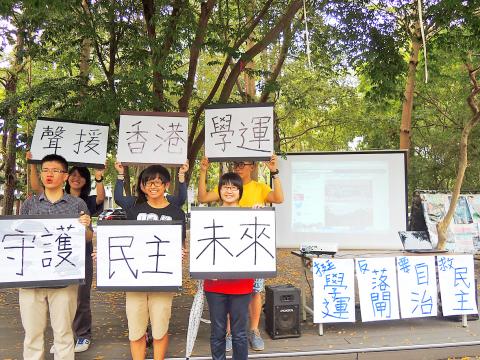The Democratic Progressive Party (DPP) yesterday voiced its support for the thousands of students and faculty members from 24 colleges and universities in Hong Kong who are on strike for democracy.
“Democracy is a value that goes beyond borders. Repeatedly, the people of Hong Kong have showed their determination for democracy,” said the DPP’s China Affairs Department director Chao Tien-lin (趙天麟), who is also a lawmaker. “The Hong Kong government and Beijing must listen to the voices of the people, look into their demands seriously, and respond to them positively.”
Chao said that over the past few years, Hong Kongers have shown a strong desire for authentic democracy and direct suffrage for the special administrative region’s chief executive through demonstrations, rallies and marches that drew large numbers of participants, as well as the Occupy Central campaign.

Photo: Hung Mei-hsiu, Taipei Times
“However, Hong Kong and Beijing authorities did not respond to their demands. Rather, they crushed [Hong Kong] people’s dream for democracy with a white paper on the practice of the ‘one country, two systems’ policy, and the Hong Kong electoral reform program,” Chao said.
“Having traveled on the same road to democracy, the people of Taiwan understand how hard it is, and can feel how the people of Hong Kong feel — dreams of democracy may be repressed, but will not disappear,” he said. “We will continue to show our concern and support for the pursuit for democracy.”
Separately yesterday, in support of the Hong Kong students’ strike for democracy, the Student’s Association of National Tsing Hua University in Hsinchu City said it has undertaken a joint action with several universities natiownide, including National Central University (NCU), National Chung Cheng University, National Sun Yat-sen University and National Taiwan University, to launch an online petition and series of lectures named “Street Seminar on Democracy (街頭民主講堂),” among other activities.
“We will also compile a ‘lazybones pack’ on related information to help Taiwanese students understand the spirit and objectives of the student movement in Hong Kong,” said Hsu Guangcheng (徐光成), president of the Students’ Association at National Tsing Hua University.
“The ongoing boycott is a large-scale movement showing solidarity among several universities in Hong Kong, with an emphasis on Hong Kongers striving for true universal suffrage and democracy,” added Chan Wan-yi (陳蘊兒), vice president of the NCU Students’ Association and herself a student from Hong Kong. “We hope that actions that express our support from Taiwan can be heard by Hong Kong students across the Taiwan Strait, to let them know that they are not alone.”
“The Chinese government has abandoned their promise of ‘democratic governance in Hong Kong,’” Hsu said. “They have neglected the results of the referendum conducted by the people of Hong Kong and turned a blind eye toward calls for true universal suffrage for the chief executive election, refusing to allow the people of Hong Kong to attain the goal of autonomy.”
Hsu said his association has already invited faculty from the school’s College of Humanities and Social Sciences, with classes for the Street Seminar on Democracy scheduled for next week.
The classes are to elaborate on the Hong Kong students’ campaign for democracy, while emphasizing the resolve to defend democracy and freedom in Taiwan, he said.

SECURITY: As China is ‘reshaping’ Hong Kong’s population, Taiwan must raise the eligibility threshold for applications from Hong Kongers, Chiu Chui-cheng said When Hong Kong and Macau citizens apply for residency in Taiwan, it would be under a new category that includes a “national security observation period,” Mainland Affairs Council (MAC) Minister Chiu Chui-cheng (邱垂正) said yesterday. President William Lai (賴清德) on March 13 announced 17 strategies to counter China’s aggression toward Taiwan, including incorporating national security considerations into the review process for residency applications from Hong Kong and Macau citizens. The situation in Hong Kong is constantly changing, Chiu said to media yesterday on the sidelines of the Taipei Technology Run hosted by the Taipei Neihu Technology Park Development Association. With

CARROT AND STICK: While unrelenting in its military threats, China attracted nearly 40,000 Taiwanese to over 400 business events last year Nearly 40,000 Taiwanese last year joined industry events in China, such as conferences and trade fairs, supported by the Chinese government, a study showed yesterday, as Beijing ramps up a charm offensive toward Taipei alongside military pressure. China has long taken a carrot-and-stick approach to Taiwan, threatening it with the prospect of military action while reaching out to those it believes are amenable to Beijing’s point of view. Taiwanese security officials are wary of what they see as Beijing’s influence campaigns to sway public opinion after Taipei and Beijing gradually resumed travel links halted by the COVID-19 pandemic, but the scale of

A US Marine Corps regiment equipped with Naval Strike Missiles (NSM) is set to participate in the upcoming Balikatan 25 exercise in the Luzon Strait, marking the system’s first-ever deployment in the Philippines. US and Philippine officials have separately confirmed that the Navy Marine Expeditionary Ship Interdiction System (NMESIS) — the mobile launch platform for the Naval Strike Missile — would take part in the joint exercise. The missiles are being deployed to “a strategic first island chain chokepoint” in the waters between Taiwan proper and the Philippines, US-based Naval News reported. “The Luzon Strait and Bashi Channel represent a critical access

Pope Francis is be laid to rest on Saturday after lying in state for three days in St Peter’s Basilica, where the faithful are expected to flock to pay their respects to history’s first Latin American pontiff. The cardinals met yesterday in the Vatican’s synod hall to chart the next steps before a conclave begins to choose Francis’ successor, as condolences poured in from around the world. According to current norms, the conclave must begin between May 5 and 10. The cardinals set the funeral for Saturday at 10am in St Peter’s Square, to be celebrated by the dean of the College